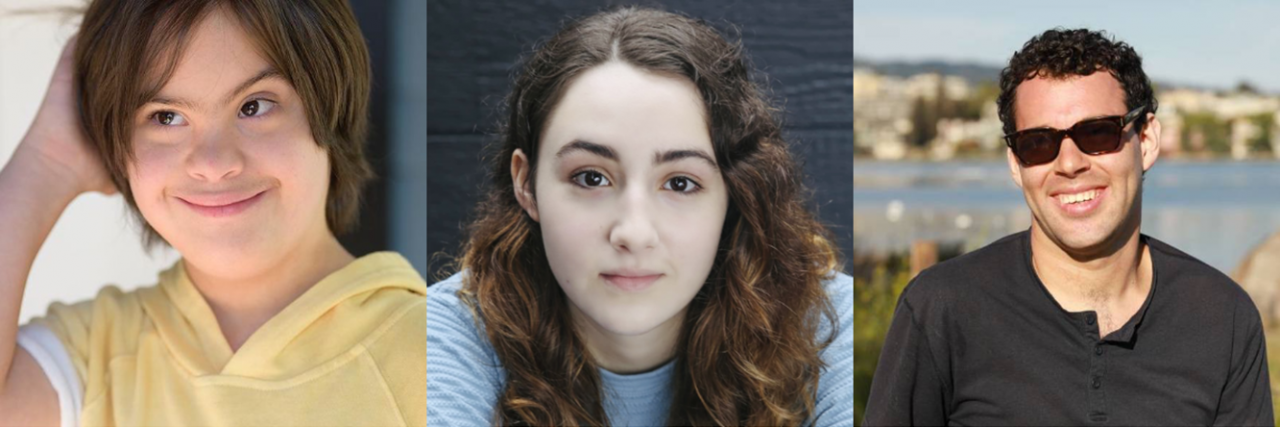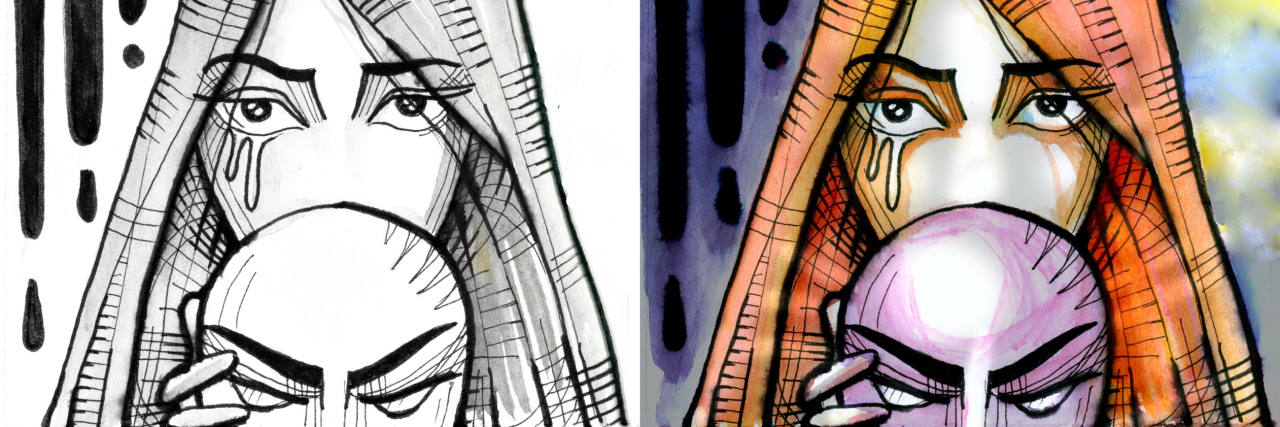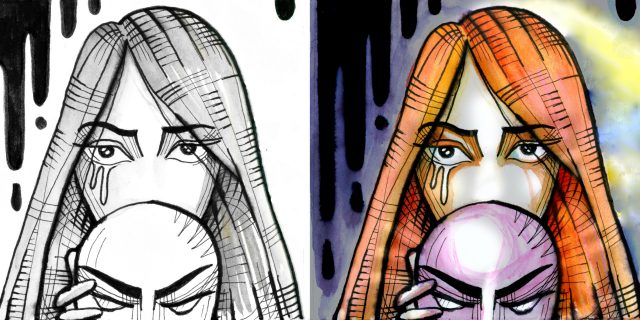I’ve known I was Hypermobile since I was about 10 years old, as my right knee bends in, and so does my left ankle, and apparently my GP when I was younger just said “Oh yes, she’s Hypermobile”. I noticed during sports that I had problems with my joints “giving way” and when I started ballet in my teens, the teacher used to shout at me to get me to stop “rolling your ankle in”! Of course, I had no control over it. I had a stress fracture of my foot once during class, but I didn’t do anything much to bring it on. Also my lower back used to regularly “go” during class, and then this affected my Sciatic Nerve, which is unbelievably painful, but I didn’t know why this was happening, as I’d never actually injured my back. I was always very fit when younger, my school friends used to catch the school bus, and I’d either jog or cycle on my racing bike to school. Also, I had been horse-riding since I was 11 years old, so my leg muscles were very strong; little did I know, doing all these sports was the best thing to help my Hypermobile joints, as keeping fit strengthens your core stability and it saved me from many more problems that I would have had if it hadn’t been for my love of keeping fit.
But even though I kept fit, I did notice that I used to get much more tired than my friends did, so I had to go to bed very early, I was often unwell, I used to get large bruises, even when I didn’t really do anything to cause them, I used to find it hard to hold a pen at school for more than a few minutes, I had problems finding shoes that didn’t give me huge blisters as my skin seemed so soft, I could never wear heals as my ankles just used to “go” so easily, so I just used to wear high-tops trainers all the time. I also used to love horse-riding, but the few times I didn’t wear riding gloves, the reins that took layers of skin off my fingers, which took weeks to heal. Another symptom I had were severe nosebleeds, but this was another symptom that no-one could explain. And I also used to get dreadful Hayfever, and I had multiple food sensitivity, and dreadful migraines, and I never knew why it was all so bad.
Then at 15 years old I started getting a severe upset stomach; everything I ate went straight through me and I went from a healthy 10 stone 10lb to under 7 stone; I looked like a walking skeleton and was told by a doctor “if you don’t start eating in 2 weeks you’ll be dead”: He accused me of being Anorexic to “get out of doing my GCSEs”, but this didn’t make sense to anyone because I was an A Grade Student wanting to be a Doctor since I was 11 years old. Thankfully my GP knew I wasn’t Anorexic, and he put me on an exclusion diet, which helped, and I put the weight back on and got better, but it took years, and I never got an explanation for why it had happened. I had to leave school early, I lost all my friends, and I have to give up my sports and horse-riding as I was too weak to continue with it all.
It took until I was about 18 to recover from this, and so then I went back to college to try and get my GCSEs. But, my health was still very up and down, and I only managed to take 2 more GCSEs as I missed so many lessons, and so I left college when I was 21, and started working part-time in a health food store. Even though I wasn’t well enough to study full-time for a medical degree, the health food store sold Homeopathy and Herbal remedies, so at least I felt like I was still able to offer help to customers who needed some medical advice, as the shop offered full training to be able to sell these products. A year after, when I was 22, I met my future husband. We had our first child, when I was 25, and although I still had “off days”, I just learned to live with feeling “not very well” most of the time. At age 28, I became pregnant with our 2nd child, but this time around I was very unwell during the pregnancy; I had terrible morning sickness, all day, every day, called #HyperemesisGravidarum and I lost over a stone in weight and so I was admitted to hospital for IV fluids and anti-sickness injections. I also had Symphysis Pubis Dysfunction; my pelvis opened up at only 4 months pregnant, something which should only happen during birth, and it left me in a wheelchair for a year as I was in so much pain if I tried to walk. I know now, that it was caused by Hypermobility. I didn’t get it during my son’s pregnancy as it is worse when you’re pregnant with girls due to the extra Oestrogen hormones, realising extra of the hormone Relaxin during pregnancy. I also had dreadful Carpel Tunnel syndrome, and could barely use my wrist during the pregnancy. The troubled pregnancy also brought on #ThyroidDisease, and I developed an Underactive Thyroid and I was told many of my symptoms were due to my thyroid condition, and also I didn’t react too well to the medication for it, which didn’t help matters, but even when I was put on a different medication that helped me, I still had many ongoing symptoms and all my symptoms, that I’d had since my teenage years, just got worse after this pregnancy.
I also had a lot of problems with my teeth for years, but even more so after I had my second child. My gums bleed every single time I cleaned my teeth, even when I used the softest toothbrush. I had to have 6 teeth capped as they used to break very easily. I became really nervous of dental visits, as anaesthetics didn’t work well at all, even when one dentist gave up to 6 injections; again, this was something else that I never understood. Also my jaw dislocated twice, and used to make a loud crack if I ate something extra chewy, I haven’t bitten into a apple since I was a child! And I also had to be very careful when I yawned to prevent it happening again.
Over the next few years I also had a few episodes where my speech was affected and I couldn’t think straight and my memory became very bad, at the hospital I was told it was probably a TIA (#TransientIschemicAttack) brought on my migraines, or stress, but I wasn’t stressed and I didn’t have a #Migraine at the time. I later found out these episodes were called “Brain Fog”, but I’d never heard of that at the time.
Then one morning out of the blue, I went completely deaf in one ear, and when I tried to get up out of bed, I couldn’t coordinate my legs, so I couldn’t walk. I thought I’d had a #Stroke, and an ambulance was called because I couldn’t move properly. In hospital it was told it was severe Vertigo, and I was given medication for it that worked, but I had symptoms for many months afterwards. Again, no-one could tell me why I had suddenly developed it or why it was so bad.
And then I became even worse at the beginning of 2012, and my IBS was so bad I lost 4 stone in weight (just as I did when I was 15). I had to be put on a liquid diet and have no solid food for 9 months to help. After many tests and a Bowel Cancer scare, and a #CrohnsDisease scare, I was told it was simply IBS, but that they’d never seen it so bad, but, again, the doctors couldn’t explain why my IBS had suddenly become so bad again. I asked if it could be linked to my hypermobility, as I had noticed that when my joints were extra painful, my bowel problems were worse too, but the consultant said “no, I’ve never heard of that”.
Then a few months later I was admitted to hospital and had a Lumbar Puncture for suspected #Meningitis, as I had such a severe #Headache. I often get very severe headache and migraines, and a pressure at the base of my skull, but this one was particularly bad. After the Lumbar Puncture I had a Tonic Clonic Seizure and had to be put on a Ventilator, and I spent 3 days in Intensive Care. Yet no cause was ever found for the seizure, and I didn’t have Meningitis, but I got no explanation as to why my pain was so bad at times or what the pressure at the base of my skull was caused by, so I was discharged from hospital yet again, not knowing why I and so many ongoing symptoms. In 2013, and desperate for answers, I paid to have a complete check-up at Harley Street, and they discovered that I had a Heart Murmur as my Mitral Valve didn’t close properly, it was overlapping when it was closing. Later, I also found out that this is quite common in Hypermobility, but again, no-one mentioned that at the time. So, I had many symptoms, that didn’t seem to “fit” with anything, and I was always left wondering what was going on, and I had just accepted that a lot of it was “just me”. Exercise, or any physical activity was now making me feel much worse, I was getting more and more fatigued and I was sleeping all the time, but yet still feeling exhausted.
In November 2014 I was told I had M.E. and I was so glad to get an explanation for my symptoms at last, because I just knew that all my symptoms couldn’t just be down to my thyroid disease, and I felt that the doctors were just blaming my thyroid disease as that was the main condition that I already had a definite diagnosis for. But after an appointment with the M.E. clinic, I was told I had Tachycardia when upright, and I did have chronic tiredness, but the specialist told me it wasn’t M.E. after all, and I felt like I was back at square one again.
At the start of 2015 I became worse than ever, I started collapsing when I stood up, and my joint pain was worse; my wrists were very painful, my hips “popped”, my back, knees, ankles were all so painful that is really affected my walking, and it all got now so bad, I had to buy a wheelchair just as I turned 41. After noticing that the reason I collapsed was because my heart was racing when I stood up, I bought a blood pressure and pulse monitor, and started recording my heart rate. Sure enough, my heart went from about 70 up to 150 just from standing up. I researched my symptoms and I found out about a condition called PoTS (Postural Tachycardia Syndrome) that fitted with some the symptoms I was suffering from. So then I put “PoTS and Hypermobility” into Google and it came up with the condition: “Hypermobility Type III #EhlersDanlosSyndrome“, and I said out loud at the computer screen THIS IS ME!! At last all my symptoms fitted! I researched EDS online and I also joined some groups on Facebook for information and support, and found that my story, and lack of diagnosis, was unfortunately not unusual. So, armed with my research and photos that I’d taken of the blood pressure monitor to show what my heart rate did when I stood up, I asked my GP to be referred to an EDS Rheumatology Specialist and I couldn’t wait to see a Doctor that knew about this condition at long last.
I saw the Rheumatology Consultant and he confirmed that I definitely have EDS Type 3, and he said it was an extreme case. At last, after 30 years of symptoms, on and off, I had my full diagnosis; the relief was like a weight off my shoulders, I actually physically felt lighter when I left the hospital. I had a load of blood tests, and I was x-rayed from top to toe, we were at the hospital nearly 3 hours. I was told my gastro problems were in fact caused by #Gastroparesis, which explains why I had so many problems tolerating solid food, so it wasn’t just IBS after all, and he sent me to a Gastroenterologist to confirm this diagnosis. I was also sent to a Cardiologist, to be put on some treatment for my PoTS. I was holding back tears during most of the appointment, and when I left him, I said; “Thank you doesn’t even begin to cover it”!
I just so wish I had been diagnosed when I was in my teens, then I could have got the help, treatment and understanding that I so desperately needed all these years, not just from the medical profession, but from doubting friends and family members too, as when you live with an invisible condition, doubt unfortunately follows you wherever you go, and this is one of the most heart-breaking things to go along with an #Undiagnosed condition. I would have loved to have followed my dream of becoming a doctor, as I still love science and medicine to this day, and I’ve never wanted to do anything else as a career, but my body sadly let’s me down. But, at least I know now what it is, and that all my symptoms were part of one condition. I was diagnosed in 2015, and 3 years later, I have had many hospital appointments and admissions, and I will continue to need hospital care, but at least now, we know what we’ve dealing with.






